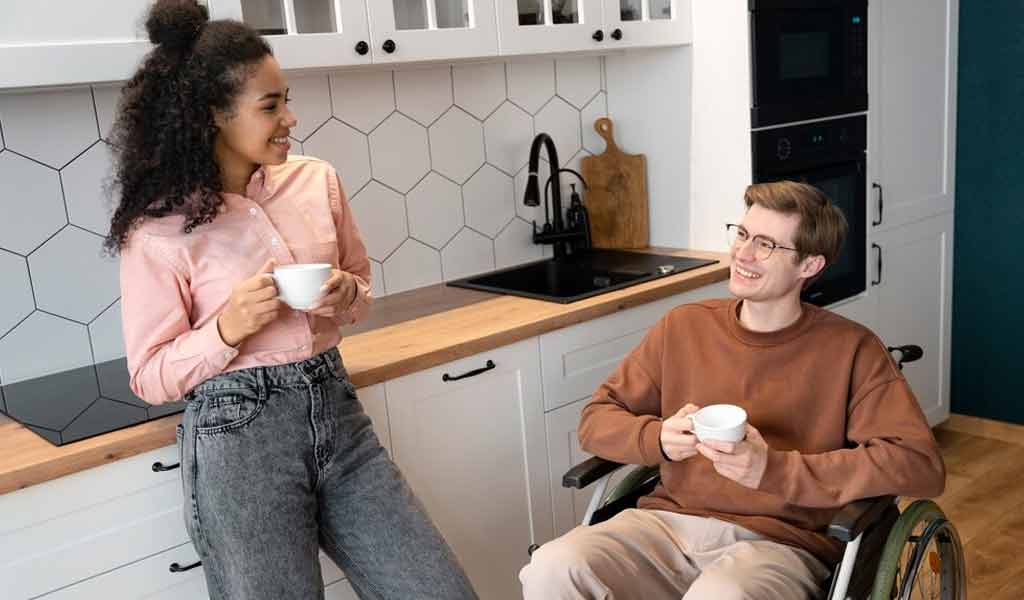We explain the main categories of supports to help you live independently in the community and achieve your goals
At its core, the national disability insurance scheme (NDIS) is about helping people with disability access the supports they need to thrive while living in the community.
Because the preferences, goals and needs of each participant are unique, this will look different for everyone.
While some people may need only a few hours of support to live in their own home, others require purpose-built accommodation and continuous care to stay healthy and well.
Despite this wide variance of support needs, the majority of the NDIS services related to living at home are grouped into one broad category—Home and living supports.
Whether you are just submitting an NDIS application or already have a plan in place, understanding the types of support available with NDIS home and living supports can help you be proactive about getting the assistance you need to pursue your goals.
To help you in your NDIS journey, we’ll provide an overview of the eight types of NDIS home and living supports in this article.
SeenCare is a specialist registered NDIS provider in Melbourne for people living with disability and high medical needs.
We deliver a range of home and living supports, including supported independent living (SIL), short and medium term accommodation, and personal care supports to participants living in specialist disability accommodation (SDA). To find out more, please contact us today.
NDIS Home and Living Supports Explained
If you need support to live at home because of disability, the NDIS may provide funding under different programs or types of support. These types of support are collectively known as home and living NDIS supports.
The 8 types of home and living supports are:
- Supported independent living (SIL)
- Specialist disability accommodation (SDA)
- Personal care supports
- Medium term accommodation
- Short term accommodation
- Individualised living options (ILO)
- Home modifications
- Younger people in residential aged care
You can find an overview of each type of support below. However, keep in mind that the eligibility criteria and options within each category can be quite complex. For this reason, it’s a good idea to talk to a local area coordinator (LAC) or support coordinator for specific advice relevant to your situation.
Supported Independent Living (SIL)
Known as SIL, for short, supported independent living is best suited to participants with relatively high support needs, who require some type of assistance for most of the day (around 6 hours or more).
Key points about SIL
- Can be provided in your own home, however most participants move into a ‘SIL house’ operated by a provider
- Supports are usually shared between three or more participants (for example, two disability support workers may be present 24 hours a day to support five participants)
- Can include support with a range of activities, such as help with household tasks, support with personal care, assistance with cooking and shopping, general supervision and overnight support
- Does not cover housing-related expenses, like rent, utilities, food, house repairs and supports covered by other NDIS funding types (eg, transport or assistive technology)
At SeenCare, we provide SIL to participants who are living in their own home, in our SIL houses and to people living in specialist disability accommodation (SDA).
Through our unique model of integrated disability and healthcare supports, we can provide everything NDIS participants with co-occurring disability and medical needs require to stay healthy and well while pursuing their goals in the community.
Specialist Disability Accommodation (SDA)
When an NDIS participant has severe functional impairment and/or high care needs, specialist disability accommodation (known as SDA) might be an option worth exploring. The main difference between SDA and other NDIS home and living supports is that funding covers the cost of specially designed, highly accessible housing.
Key points about SDA
- SDA covers the cost of constructing accommodation to meet the individual requirements of participants with very high needs
- To reduce conflicts of interest, the supports for a person in SDA are increasingly being delivered by a separate provider to the owner/operator of the house (likely to be mandated in the future)
- SDA accommodation is usually shared by several participants
- While the cost of constructing or modifying the house is covered by the NDIS, the resident still usually needs to pay rent and contribute to utilities
Most NDIS participants do not qualify for SDA. A good question to consider regarding eligibility is, “Am I able to live in mainstream housing with no or minimal to moderate home modifications (eg., ramps, rails, level floors, etc).”
If mainstream housing is unlikely to be suitable for you for the foreseeable future, it may be worth considering SDA. However, you will need convincing medical evidence confirming and explaining your functional limitations.
While SeenCare does not provide SDA accommodation, we have strong working relationships with many SDA organisations throughout Melbourne and surrounding areas. If you have been approved for SDA, please feel free to contact us to see if we would be a good match to deliver your supports. If so, we will gladly help connect you with an SDA accommodation provider.
Many NDIS participants are funded for personal care supports. This type of home and living support can cover a range of tasks related to daily activities, such as help with toileting, support at meal times and assistance with mobility and transfers (you can find more details on our Personal Care page).
Key points about personal care supports
- Can be delivered across a variety of living settings (eg., in your own home, in SIL or SDA)
- Covers a range of activities that may be impacted by disability, such as eating and drinking, getting to appointments or using aids and equipment
- Personal care supports are generally limited to no more than 6 hours per day
If you need help with personal care tasks—including those related to health, like managing medications and working with a GP—SeenCare can help.
Our team includes disability support workers, home nurses and bulk-billing GPs. This enables us to provide a level of care and support to participants with high medical needs that few providers can match.
Medium Term Accommodation
Sometimes, a wait on suitable housing can be the main barrier in an otherwise complete support plan. This might occur, for example, when a participant has a confirmed spot in a SIL house, but the vacancy is not available for several months. In this situation, the NDIS may fund medium term accommodation so you have somewhere to live while waiting for your long term accommodation to become available.
Key points about medium term accommodation
- Only available for NDIS participants waiting for a confirmed long term housing solution
- Usually funded for up to a maximum of 90 days
- Must prove why you can’t remain in your current accommodation
- Eligibility criteria are different for people being discharged from hospital or prison
While our core business revolves around long term NDIS home and living supports, we can sometimes assist with medium term accommodation. If you have funding for medium term accommodation, please contact us and we will advise if there are any temporary vacancies in our SIL homes in Melbourne.
Short Term Accommodation
If you need to live outside of your regular home for a short period (perhaps because your regular carers are away), you may be able to access funding for short term accommodation.
Short term accommodation might be used for respite, to try out a new living arrangement or something else. It includes the cost of personal care, housing, meals and any activities you might do with the provider.
Key points about short term accommodation
- Usually funded for up to 14 days at a time, with a total of 28 days per year
- Works best when funding is pre-approved in an NDIS plan, so participants and carers can plan to use respite throughout the year (or save for unexpected emergencies)
- Funding is for group accommodation, unless specified otherwise
As with medium term accommodation, we can provide short term accommodation in a SeenCare SIL house when we have a vacancy. We specialise in providing NDIS home and living supports for participants with high medical needs, but we welcome referrals for participants from all backgrounds.
Individualised Living Options (ILO)
ILO differs from other accommodation focused home and living supports NDIS, in that it is primarily about exploring, planning and organising living options. ILO involves identifying the formal and informal supports you need to live independently, then creating a service proposal to put those supports in place.
Key points about ILO
- ILO does not include funding for where you live or home modifications
- It involves two stages: exploring different ways to live, then designing supports to help you live in a way that supports your goals
- You do not need to have severe limitations or very high needs to access ILO
Home Modifications and Assistive Technology
If you have limited mobility or movement due to disability, modifying your living environment may help you live more independently at home. Some common examples of home modifications and assistive technology are grab rails, ramps, level floors and wider doorways. Where there is evidence that a home modification would increase safety and independence (of the participant and/or carers), the NDIS may provide funding to cover the costs of this in your plan.
Key points about home modifications
- Most substantial home modifications will require an occupational therapy report detailing the modifications required
- Low cost items (such as a weighted shower curtain or portable ramps) can be purchased from a hardware store or disability equipment retailer
- Home modifications will not include costs to make your house larger or to repair pre-existing damage
Younger People in Residential Aged Care
For a complex variety of reasons, some younger people (under the age of 65) with disability are living in nursing homes. In these situations, a person may apply for NDIS funding via home and living supports to help them move out of residential aged care.
Key points about younger people in residential aged care
- Moving out of residential aged care is a choice, not a requirement
- The first step is to test eligibility for the NDIS. Ability First is an organisation that can assist with this
- A significant amount of planning and preparation (months to years) is involved in moving from a nursing home into housing in the community
Future Directions for NDIS Home and Living Supports
The 2023 NDIS Review highlighted many of the problems NDIS participants face with home and living supports. These centred largely around people with disability still not having “choice about where they live, who supports them and who they live with.” Disconnection and inequity in planning decisions around housing and support were also identified as ongoing challenges.
In terms of solutions, the review panel made a range of recommendations for fairer, more consistent NDIS home and living supports that encourage choice. There were also specific recommendations made for SDA, such as formally separating accommodation and living supports and upgrading or repurposing ageing SDA homes.
Regardless of what the future holds for NDIS home and living supports, the key takeaway is that there are a variety of flexible accommodation and support options available right now for people with disability.
While the names and features of programs may change in the future, home and living supports are a core feature of the NDIS, and they won’t be going away anytime soon.
Whether you are a new participant or have had a plan for some time, staying up to date with the options for NDIS home and living supports can help you be proactive about getting the assistance you need to live independently and achieve your goals.
SeenCare is a specialist registered NDIS provider in Melbourne for NDIS participants with high medical needs. We provide a range of NDIS home and living supports, including SIL, SDA and more. To find out more or to make a referral, please contact us today.














